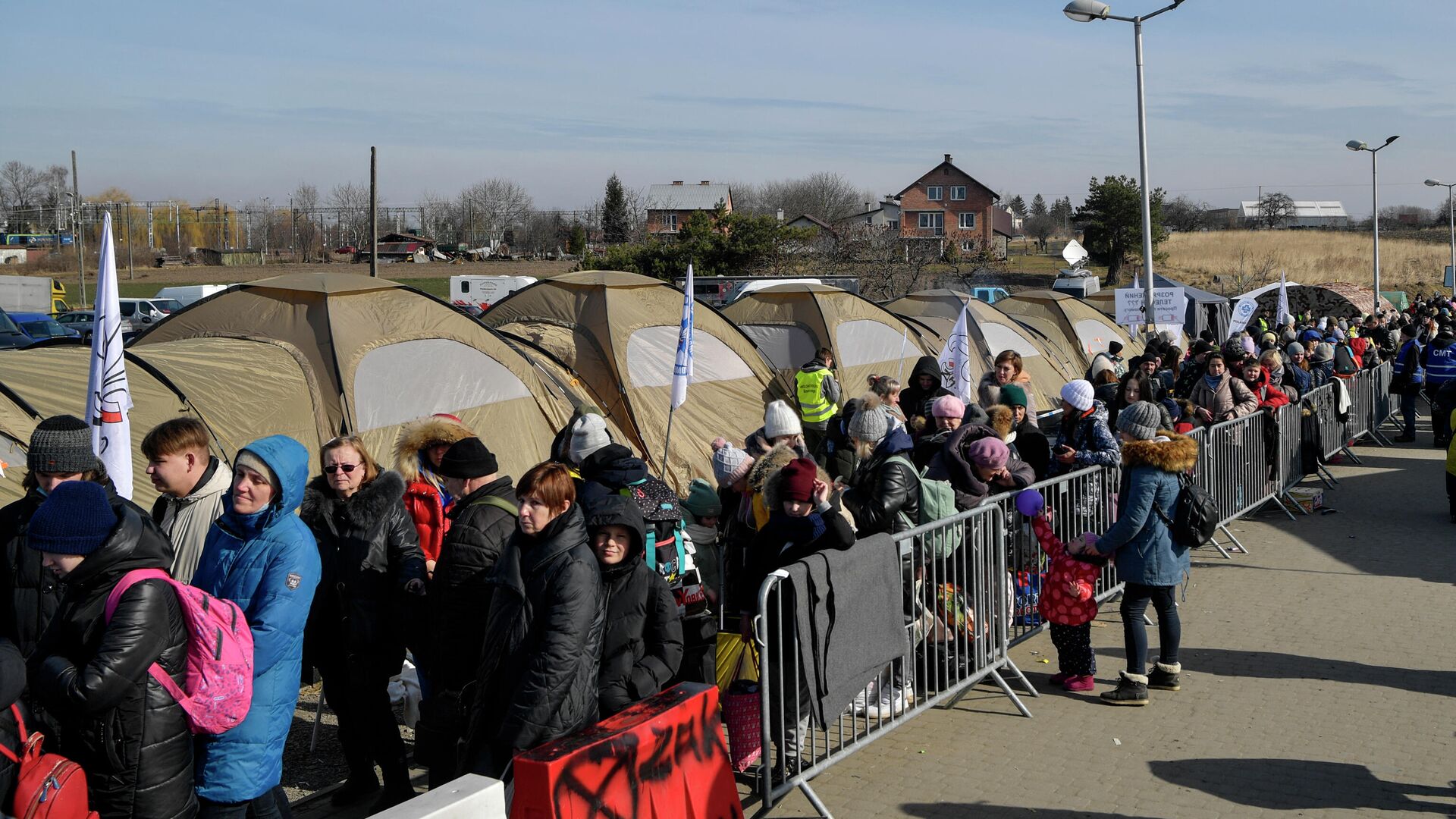https://sputnikglobe.com/20220323/danish-pm-says-displaced-ukrainians-must-return-rebuild-their-homeland-1094104016.html
Danish PM Says Displaced Ukrainians Must Return, Rebuild Their Homeland
Danish PM Says Displaced Ukrainians Must Return, Rebuild Their Homeland
Sputnik International
Earlier, Denmark adopted a special law that in effect allows for the preferential treatment of Ukrainian refugees, which has sparked criticism from human... 23.03.2022, Sputnik International
2022-03-23T06:18+0000
2022-03-23T06:18+0000
2022-03-23T06:18+0000
russia's special operation in ukraine
newsfeed
ukraine
denmark
scandinavia
russia
refugees
https://cdn1.img.sputnikglobe.com/img/07e6/03/0d/1093823389_0:160:3073:1888_1920x0_80_0_0_ddbf16a419b5112f3fb637a01869c63b.jpg
Less than two weeks after adopting a special law on preferential treatment for Ukrainian refugees amid Russia's ongoing military operation in Ukraine, Danish Social Democrat Prime Minister Mette Frederiksen has proclaimed that they will ultimately return to their homeland.Remarkably, she was mirroring the words which had been said by Ukrainian ambassador to Denmark Mykhailo Vydoinyk, who suggested that Ukrainian refugees should not be integrated into Denmark, but return to their home country and help build it up when the time is right.The Danish Foreign Minister, Frederiksen's party mate Mattias Tesfaye said that the government expected that “significantly more” Ukrainians could arrive than the 20,000 for whom the municipalities had prepared originally.Through the special law, the Ukrainian refugees have been allowed to stay in Denmark for two years, where they'd be granted work permits as well as access to education and health services. The law was adopted urgently and in record time through a cross-party consensus.The Danish approach has sparked criticism from, among others, Human Rights Watch, which accused the Nordic country of double standards in treating refugees from different countries. According to the organisation, in the past years, Denmark has been “at the forefront among European countries to enact pernicious laws and policies designed to deter people from seeking asylum”, to the point of declaring a zero-asylum policy. The organisation also noted the so-called “jewellery law”, which allowed the government to seize asylum seekers’ assets, including their jewellery, to fund their stay in the country. Remarkably, Ukrainians were exempted from this law.Russia's military operation to in Ukraine was launched on 24 February, in response to calls for help from the People's Republics of Donetsk and Lugansk amid shelling by Ukrainian forces. According to the UN, over three million Ukrainians have since left the country.
ukraine
denmark
scandinavia
Sputnik International
feedback@sputniknews.com
+74956456601
MIA „Rossiya Segodnya“
2022
News
en_EN
Sputnik International
feedback@sputniknews.com
+74956456601
MIA „Rossiya Segodnya“
Sputnik International
feedback@sputniknews.com
+74956456601
MIA „Rossiya Segodnya“
newsfeed, ukraine, denmark, scandinavia, refugees
newsfeed, ukraine, denmark, scandinavia, refugees
Danish PM Says Displaced Ukrainians Must Return, Rebuild Their Homeland
Earlier, Denmark adopted a special law that in effect allows for the preferential treatment of Ukrainian refugees, which has sparked criticism from human rights organisations over unequal attitudes towards refugees based on their country of origin.
Less than two weeks after adopting a special law on preferential treatment for Ukrainian refugees amid Russia's ongoing military operation in Ukraine, Danish Social Democrat Prime Minister Mette Frederiksen has proclaimed that they will ultimately return to their homeland.
“Being a refugee is temporary, so you have to return and help build up your homeland when you get the opportunity. It allows us to help other refugees,” Frederiksen said in a statement.
Remarkably, she was mirroring the words which had been said by Ukrainian ambassador to Denmark Mykhailo Vydoinyk, who suggested that Ukrainian refugees should not be integrated into Denmark, but return to their home country and help build it up when the time is right.
The Danish Foreign Minister, Frederiksen's party mate Mattias Tesfaye said that the government expected that “significantly more” Ukrainians could arrive than the 20,000 for whom the municipalities had prepared originally.
Through the special law, the Ukrainian refugees have been allowed to stay in Denmark for two years, where they'd be granted work permits as well as access to education and health services. The law was adopted urgently and in record time through a cross-party consensus.
The Danish approach has sparked criticism from, among others, Human Rights Watch, which accused the Nordic country of double standards in treating refugees from different countries. According to the organisation, in the past years, Denmark has been “at the forefront among European countries to enact pernicious laws and policies designed to deter people from seeking asylum”, to the point of declaring a zero-asylum policy. The organisation also noted the so-called “jewellery law”, which allowed the government to seize asylum seekers’ assets, including their jewellery, to fund their stay in the country. Remarkably, Ukrainians were exempted from this law.
“While the Danish response to Ukrainian refugees is commendable, invoking European solidarity does not justify the mismatched treatment for Syrian refugees, some of whom have been stripped of their basic rights and forced to stay in deportation centres, where they are left in agonising limbo with the choice to live deprived of the right to work and get an education or return to Syria”, HRW
said.
Russia's military operation to in Ukraine was launched on 24 February, in response to calls for help from the People's Republics of Donetsk and Lugansk amid shelling by Ukrainian forces. According to the UN, over three million Ukrainians have since left the country.


